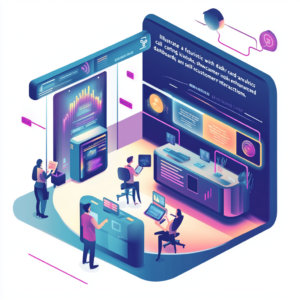
“DeepSeek AI Faces Global Regulatory Backlash Over Privacy and Security Concerns”
In the whirlwind of today’s tech landscape, where artificial intelligence dances across the stage like a rockstar, it’s hard to ignore the rebellious undercurrents pulling at its hem. One of the key players making headlines (and not necessarily for the right reasons) is DeepSeek AI. It's like that edgy band that everyone’s talking about, but the critics are throwing tomatoes. So, why is DeepSeek AI at the epicenter of regulatory ire? Let’s take a stroll down this intriguing alley and peel back the layers of this complex conundrum.
When you pull back the curtain on DeepSeek AI, you quickly realize that its ascent hasn’t just peaked with applause; it's been more akin to strutting on broken glass, with regulators trailing closely behind, pointing fingers and wagging their tongues. The glitches and gaffes in DeepSeek’s orchestration have meant that where there’s innovation, there’s also a big fat question mark hovering over public and private trust.
First off, let's talk about the elephant in the room: privacy. In an age where selling data feels as commonplace as bartering widgets at a flea market, DeepSeek AI’s ability to harvest data is raising hackles across the globe. Reports suggest that it’s not simply data collection that’s at question, but the granularity of that data. We’re talking about a precise surveillance system that can track users with the precision of a guided missile—a level of monitoring that would make even the most seasoned snoops go pale.
Imagine living in a world where your every digital footprint is tracked as casually as a newspaper clipping. That’s what many regulators fear with DeepSeek. It collects device-specific information and individual tracking metrics that would send a chill down the spine of even the most ardent privacy advocate. What’s even more concerning is this company’s hazy lens on transparency. While competitors such as OpenAI and Google lay their cards on the table, DeepSeek appears to be playing poker with its users’ trust. The absence of a clear policy delineating how personal data is treated leaves much to be desired—and leaves regulators scratching their heads, saying, “Whoa, not on our watch!”
Then we have the regulatory bandwagon. Countries from Australia to Texas are hopping onboard this moving train of skepticism. Australia, Canada, Italy, South Korea, the Netherlands, and even budding tech hubs like Taiwan have thrown down the gauntlet, ushering sweeping bans on DeepSeek. They’re waving the flag for public safety, privacy concerns, and national security like it’s an Olympic sport. Meanwhile, in the U.S., legislators have taken it a step further by proposing acts that would force federal employees to choose between their work and the wonders of DeepSeek AI.
These actions, in turn, put the average user in a precarious position. Imagine standing on the edge of a cliff and feeling the ground beneath you shake; that's how it feels to be an everyday user of DeepSeek. With privacy violations rearing their ugly heads, the notion of sensitive information being sold on the black market is not merely a plot twist in a dystopian novel—it’s a reality that many fear. Government agencies and private corporations are already pulling back, implementing bans on DeepSeek, making it crystal clear that if the higher-ups don’t trust it, they’re certainly not expecting the public to walk the plank.
Now, let's shift gears and turn our attention to the business world. Companies are left pondering their next moves as they navigate consumer-facing applications in light of DeepSeek's dubious reputation. For firms embracing AI’s rippling innovations, making sure their privacy policies are in alignment with local and international protocols is not just a responsibility—it’s a ticking time bomb. If you’re integrating DeepSeek AI, best believe you’re dancing on the razor’s edge of compliance. No one wants to play legal hopscotch with the authorities over potential data breaches.
Adding to the regulatory woes is Europe’s tireless effort to enforce the General Data Protection Regulation (GDPR), which has set a global benchmark for data protection. The European Data Protection Board (EDPB) isn’t merely sending out passive-aggressive emails; they’re rolling up their sleeves, diving into the nitty-gritty, and scrutinizing DeepSeek like never before. They’ve carved out a taskforce, allowing exchanges with other heavyweights in the field like OpenAI's ChatGPT. Expect more pushback and layers of due diligence as these regulatory bodies keep up their heavyweight brawl against less-than-transparent entities.
The narrative of DeepSeek AI isn't just a cautionary tale; it’s an urgent wake-up call. In a digital ecosystem where trust is the currency, one false note can lead to a world of regulatory and ethical chaos. As these intricate issues bubble to the surface, it's essential to remember a few key takeaways: ensure that any AI models you consider are airtight with compliance to local and international laws; expect transparency and don’t settle for less—it’s your data after all; and, if anything, always conduct rigorous risk assessments before diving headfirst into new technologies.
So, what does this mean for the future of DeepSeek AI? If it doesn’t adjust its sails and start addressing these mounting concerns head-on, it might just become the poster child for regulatory caution—a sad fate for an innovator that could’ve changed the game.
Let's not beat about the bush; the road ahead for DeepSeek AI is going to require an unyielding commitment to ethical practices and a serious overhaul of how it handles user data. We could have a glorious innovation in our hands or continue an existential struggle marred by skepticism and mistrust.
As our modern technological saga unfolds, let this be a turning point—not just for DeepSeek but for all players navigating the murky waters of AI. Together, we can shape a future where innovation doesn’t have to come at the cost of our fundamental rights.
Want to stay up to date with the latest news on neural networks and automation? Subscribe to our Telegram channel: @ethicadvizor

